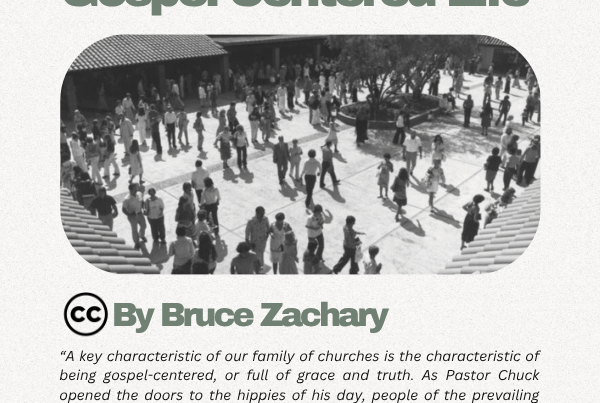
It seems that no matter how much nuanced hinting or explicit declaration happens in churches, people still stumble over the question of “Do we need the Old Testament?” For some it’s interesting but not instructive. For some it’s awkward and not authoritative. For some it’s plain banal and therefore certainly not binding. Neither references and quotes made, nor promises and prophecies fulfilled, seem to cement in people’s mind that yes, we DO need the Old Testament.
Let me give you just five reasons (of many) why we do.
1. All Scripture (the entire Bible) is God breathed and has been Divinely preserved for your benefit, not just the last quarter (2 Timothy 3.16).
When Paul wrote this to Timothy, he wasn’t just thinking about the records of Jesus’ birth, life, death, and intervening ministry (Matthew-John).
Neither was he just thinking of the testimony of those who lived with and learned from Him (Acts, for example).
Neither was he only thinking of the Hebrew Scriptures (cf. 2 Timothy 3.15).
Paul was so often a big-picture guy, and his declaration that all Scripture is breathed out by God most certainly starts in Genesis and then includes the aforementioned records of Jesus’ life, ministry, death, resurrection, and legacy.
2. As believers, the New Testament gives us the hope of Jesus. The Old Testament shows us whyit was needed.
Again, and again, and again in the Old Testament, we see people doing their utmost to live the life God wants for them but failing. We see the fallen, fallible, and frail human condition come to the fore again and again. On their own and in their own strength and power, people simply can’t cover the space and separation between themselves and God that their sin has created.
We see in the Old Testament that, at the core, people want and need a figure of hope, someone to look to who will put this inability of theirs right. For a while, the figure was a judge (Judges 3.15); for a while, it was a king (1 Samuel 8.19-20). None worked, truly. The longing for something better remained. The longing for someone better remained. The New Testament makes clear that this person is, ultimately and permanently, Jesus.
3. The New Testament picks up right where the Old left off.
So much is shared in the first few books of your Bible. There’s creation, covenants between God and man, the promise of a Messiah, and time after time, the human condition is shown, warts and all. So many threads and themes are begun, so many promises are promised, and so many dilemmas are detailed. The New Testament picks up each, answers them neatly, and resolves them without fail in the person and work of Jesus.
Consider but a few:
See the story of Jael and her radical obedience in Judges 4 and how the New Testament flawlessly completes this arc.
See the proto evangelium, the first Gospel, of Genesis 3.
See the mathematical and chronological accuracy of the prophecies of Daniel.
See the prophetic declarations of Isaiah and Micah about the birth of Jesus.
See the suffering Saviour in Isaiah and the Psalms.
So much is predicted and begun in the Old and comes to fruition and finality in the New. To detach the two would be to have an answer to a question nobody asked.
4. Jesus said He came to fulfil, not abolish (Matthew 5.17).
Jesus fulfilled the sacrificial and atonement laws of the Old Testament. We’re no longer required to live by the complex atoning framework of Leviticus to be in God’s presence, for example. However, the character, selfless love, and behaviour of a believer draws much from the Old Testament (Romans 7.12). Jason Derouchie wrote that
“As Moses asserted, in the day of heart circumcision (Deut. 30:6), which we are enjoying today (Rom. 2:29), all of his teachings in Deuteronomy would still matter: “And you shall again obey the voice of the LORD and keep all his commandments that I command you today” (Deut. 30:8).”
Whilst we are no longer required to offer sacrifices for sins or to observe ceremonial laws, do we ever move past commandments like Deuteronomy 6.5?
“You shall love the Lord your God with all your heart, with all your soul, and with all your strength.”
To say that the Old Testament no longer matters is tantamount to saying passages like that don’t matter, and Jesus said otherwise (cf. Matthew 22.37).
5. Jesus said it all points to Him (John 5.39; Luke 24.27, 44-47).
Quite simple this one.
Jesus said it’s all about Him, so why wouldn’t it matter to those that love, follow, and believe in Him?
* * *
These are just five reasons why the Old Testament is important. We as a church have been working through it one chapter a week for a few years, and I honestly can’t remember how many times something has come up in Genesis or Exodus (for example) that has then been preached from a New Testament book on a Friday. To be believers with a well grounded, firm, and secure faith, we need to feed ourselves on the full counsel of Scripture, not just the last quarter.
I’d love your thoughts on the Old Testament:
Are you currently reading part of it?
Are there parts you’ve never read?
Are there parts you don’t understand?
Further Reading
https://jamestravis.net/2021/03/10/jael-radical-obedience/
References
https://jasonderouchie.com/10-reasons-why-you-should-read-the-old-testament/










